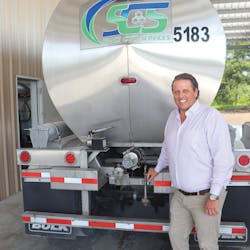One trucker’s treasure: Waste hauling boosts Space City’s bulk business
HOUSTON—Industrial plant waste is Space City Services’ business-boosting treasure.
The Texas-based bulk carrier began hauling waste in 2015 to balance its cyclical finished products activities, provide a value-added service for customers, and keep its drivers on the road. It diversified to offer waste container leasing and transportation through the acquisitions of Superior Waste Solutions, TIBC Rentals and Transportation’s bulk services division, and Industrial Waste Solutions, all in the last three years.
Waste hauling now accounts for 60% of the operation—and equipment rental is Space City’s fastest-growing segment.
“It’s different,” said Robert Thomas, Space City president, who founded the company as a flatbed carrier in 2000 and transitioned to liquid bulk in 2009. “Most bulk carriers in Houston offer one service. They haul whatever product they haul day in and day out, and that’s given us an advantage. These plants produce waste every day. They don’t shut down, they keep running 24 hours a day, and they’re always creating some amount of waste, whether it goes to a landfill or a recycling facility. So, we thought, when the economy ebbs and flows, waste would be a way we could keep working and maintain an upward trajectory.”
The carrier’s launch plan is working to perfection.
Space City grew annual revenue by $10 million in each of the last three years, despite the COVID-19 slowdown in 2020 and ongoing economic concerns—and it’s on pace to exceed that growth rate again this year, while also expanding its pool of drivers and vehicles, and ordering 200 new roll-off containers for its rental fleet.
“Fortunately for us, we’re still growing,” Thomas said.
Blasting off
Those 25-cubic-yard roll-offs will swell Space City’s box fleet—which includes vacuum boxes, frac tanks, and more—to 800 units, and increase its overall fleet to more than 1,200 pieces of equipment, including 200 tank trailers.
Not bad for an entrepreneur who dealt in a much different line of equipment 25 years ago.
Thomas’ father, James, and grandfather, Robert, were union truck drivers, so he grew up around the industry, in Snyder, Texas, saw the struggles they endured, and, after a short stint as a commercial truck driver while in college, decided the life wasn’t for him. “I really didn’t anticipate being in the trucking business,” he recalled. “I was in the restaurant business before this. I had a little hamburger joint [Dubl-R, for Robert and Robert] I opened with my granddad in 1992 … and it’s still open, with our name on the sign, in Waco, Texas.”
However, Thomas sold the hamburger business to relocate to Houston, where he went to work selling refrigeration equipment to bars and restaurants. But when that didn’t pan out, he returned to his trucking roots, founding Space City in 2000 as an open-trailer carrier transporting building materials and heavy equipment. He pivoted to bulk liquids after the 2008 recession crashed the housing market—and the demand for flatbed trailers. “A friend of mine said, ‘Hey, you should look into hauling bulk liquids. You could really help us with a customer,’ and I said yes,” said Thomas, who still regularly drove trucks up until 2007. “And I had a couple qualified guys at that time, who had the tanker experience, so we migrated in.”
Space City grew from 20 to 80 trucks over the next six years. Then, when the once-plentiful oilfield business that fueled the company’s early expansion dried up, leaders turned to waste to keep momentum going. Today, the carrier runs 128 tractors, employs nearly 200 people, and maintains four locations serving Gulf Coast customers: Two in Houston, including its headquarters, one in Corpus Christi, and one in St. Gabriel, Louisiana.
The company’s 28-acre Houston headquarters includes a 35,000-sq.-ft. building with offices, seven double-wide shop bays, and a parts room, and a separate building for renewing boxes with Space City’s signature aqua green paint.
Waste not, want not
Expanding services to include waste hauling just made sense, leaders agreed.
Every time Thomas visited a customer facility, or a Space City driver delivered a chemical load, like ethylene glycol, they saw other carriers entering with waste boxes or exiting with vacuum trailers, and wondered why they weren’t doing it. “We already had the customer,” Thomas said. “They knew us, trusted us, and we had a good reputation, so it was an easy discussion to have—then and now—with the plants we were in, about, ‘Hey, can we haul your waste? What do you do with it, where does it go, or who hauls it for you?’”
After Space City secured the proper permits and officially launched its waste-hauling services in September 2015, new waste customers also unlocked new finished-product opportunities. “If we do waste at a plant, we’ve been able to go after their finished-product business, and bid on that,” said Jim Sorg, vice president of sales and marketing. “Because it might go through a different person, but they already know us.”
Thomas said learning the box business took time—but was much easier than transitioning from flatbeds to tanks.
“Most of our transportation competitors are only into transportation, and our box competitors—although they may be much bigger right now, we’re starting to catch up—only rent boxes,” Sorg added. “They might offer some transportation services, but they can’t do everything we can do on the transportation side.”
Container leasing now makes up 20% of Space City’s overall business, and 60% of its transport operations involve waste, from the sludge at the bottom of storage tanks to benzine wastewater and other flammable liquids. And the combination of services ensures Space City, and its drivers, always are making money.
“For the past couple of months, we’ve been slower on the product side, but we can take those drivers who aren’t working for us on the product side, and put them on waste,” Sorg said.
Operational excellence
Space City didn’t waste time during the pandemic, with waste services helping generate $16.5 million in revenue in 2020, despite the slowdown.
But the new service only partially explains the carrier’s rapid recent expansion.
Thomas’ trucking background is at the heart of their success, helping him to remain calm during downturns, and quickly pivot to new business as needed. “It’s given me a lot more patience than some of my peers,” he asserted.
A “disruptive” mergers-and-acquisitions market also plays a key role. “That has created a lot of opportunity,” confirmed Stephen Wendel, Space City general manager, not only allowing them to add new equipment and services through their own acquisitions, but also new customers who aren’t satisfied with the changes.
Savvy marketing helps, too. Thomas embraced “H-Town”—home of NASA’s Johnson Space Center, Houston Rockets basketball, and Astros baseball—when he named his company Space City. An owner-operator with an Astros-themed truck participated in the team’s World Series championship parade last year. Space City also sells itself as a carrier that is diverse enough to meet multiple needs—including sustainability goals when hauling byproducts to “waste-to-energy” facilities—without neglecting customers.
That’s why they tripled revenue over the last three years, and now are looking to move into new markets.
“The operation isn’t layered so deep that you can’t get service, or get somebody to answer the phone,” Thomas said. “And we can make decisions that bigger, or even like-sized, companies can’t make as quickly.
“We’re pretty agile when it comes to taking care of customers.”
Driving force
Caring for drivers is an equally high priority.
Space City compensates long-haul drivers by percentage of load, and local and regional drivers—who make up 70% of their fleet and make it home regularly—by the hour. “You have to find the right job for the guy,” Thomas added. “There is no cookie-cutter approach. Every driver is different.”
By meeting their individual needs, Space City keeps its turnover low, creating a driver pool filled with highly tenured employees—and the carrier’s top recruiters. “I could spend a ton of money on recruiting, and still our No. 1 way of finding new drivers is from our current driver referrals,” Wendel maintained. Space city strengthens the advantage with referral and sign-on bonuses, helping it hire seven drivers in late September.
The carrier also attends industry events, like the Women in Trucking Association’s (WIT’s) annual conference in Dallas, helping it add six female drivers, and women in key leadership roles, including its operations manager, top recruiter, and marketing lead.
Prospective drivers need three years of experience with tanks. Orientation lasts at least a week, and then new drivers head out with a trainer. “Once they finish orientation, we place them with a driver trainer for however long it takes,” said Rex Walker, Space City safety director, and a former highway patrol officer. Space City also holds weekly training sessions for continuous education bolstered by J.J. Keller’s on-demand videos.
Diverse equipment
Space City started with leased vehicles and shipper-owned trailers (SOTs). Now it buys most of its equipment but still pulls Circon SOTs used for cleaning out tank bottoms.
Wastequip is supplying the carriers’ new roll-off containers. Tankers are sourced from Polar Tank Trailer and Wabash. Space City expects to begin taking delivery of 50 7,000-gallon MC 307/DOT 407 trailers from Polar in November, said Wendel, who began spec’ing 2205 stainless steel four years ago, resulting in a “huge reduction” in pitting.
“The corrosion resistance you get with the 2205s is impressive,” he said. “We’ve seen much better longevity on our tank trailers with that material.”
In addition to the 200 tank trailers, Space City runs 46 code and non-code vacuum trailers, 30 roll-off trailers for hauling boxes, 13 roll-off bobtail trucks, and a fleet of flatbed and step-deck trailers. Express Container Service handles equipment cleaning, unless the customer requests a different service provider. “A small portion of the vacuum trailers are non-haz, which can haul wastewater that doesn’t have any contaminants, or things that come out of the process that aren’t considered by DOT or EPA as a hazardous waste,” Wendel explained.
Peterbilt is the go-to supplier for company-owned trucks (about 60% of the fleet; the rest are owner-operators). Space City recently ordered 10 new Peterbilt units it expects to receive in the second quarter of 2024. The carrier also runs Freightliners and Internationals. “We buy a little of everything, honestly,” Thomas said. That includes used trucks when necessary. Space City ordered 12 trucks in 2021 but only received two.
“Allocations were so bad, you couldn’t get any new trucks,” Wendel said.
New trucks feature automatic transmissions and forward-facing Samsara cameras. Walker said he’s evaluating side- and rear-facing cameras but remains “undecided” on inward-facing dashcams. “I’d like to see them, but I’ve been told by attorneys not to do it,” he said. Space City leaders don’t anticipate buying electric trucks anytime soon, but the carrier recently boosted its sustainability rating with EcoVadis certification.
Most importantly, it’s still adding vehicles to its diverse equipment fleet.
“Right now, in our business, this is turnaround season, because it’s usually done at the end or the beginning of the year, in cooler times, but we’re ramping up while other carriers are slowing down,” Thomas concluded.
About the Author
Jason McDaniel
Jason McDaniel, based in the Houston TX area, has more than 20 years of experience as an award-winning journalist. He spent 15 writing and editing for daily newspapers, including the Houston Chronicle, and began covering the commercial vehicle industry in 2018. He was named editor of Bulk Transporter and Refrigerated Transporter magazines in July 2020.

